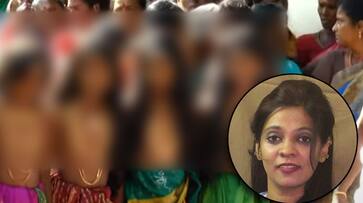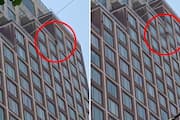Threats to journalist over the Madurai temple story raise disturbing questions

For the last two days, Vidyashree Dharmaraj, the editor-in-chief of Covai Post, a 30-month-old digital venture based out of from Coimbatore, that focuses on issues in Tamil Nadu, and more specifically western and southern parts of the state, has been receiving abusive and threat calls. Over 200 of them so far. This was after a story her website reported on the bizarre practise of bequeathing girl children in their teens and pre-teens to the village deity in Madurai district.
What is horrifying about this ritual that has apparently been in vogue for centuries is that the seven girls, aged between 9 and 13, are made to live in a temple for two weeks in September, without any upper garments. The chief priest of the Yezhaikaatha Amman temple in Vellalur has the prerogative of selecting the seven girls from among scores of adolescent girls, all from the same community hailing from 62 villages. The footage shows them wearing silk sarees and gold jewellery with no blouse to cover their modesty. They have to stay in the temple under the care of the priest in the same manner.
The parents of the girls are willing partners to this practise, buoyed by the superstition among villagers that they get to see divinity in the little girls. Of the seven girls chosen this year, three are in Class 8, two in Class 7 and two in Class 5.
Following the release of the video, the district administration stepped in, asking the Revenue District Officer and Social Welfare officer to monitor the festival. Parents also have been asked to cover the girls in a shawl.
But there seems a reluctance to intervene in what is seen as a religious matter, raising doubts over whether it is because the villagers hail from a politically powerful community. The administration is relieved there has been no complaint yet of sexual abuse. This laidback attitude comes at a time when instances of even 2-year-old girls being raped are regularly reported from across India.
Ever since the story with the footage was published on Covai Post, Vidyashree's phone has not stopped ringing. Most of the callers seem to have a connect with the 62 villages, going by the manner they have been trying to intimidate, abuse and threaten Vidyashree for reporting the story. Initially they tried to troll the executive editor AR Meyyammai, who had gone inside the temple and shot the girls in a state of undress, but after she disabled her Whatsapp, Vidyashree was targeted.
"Did you do it on your own and did someone ask you to do it?'' one caller asks, hinting at a conspiracy against the village.
"Who are you to speak about our Vellathur religious ritual? You will have to answer for what you have done. Let the 15-day ritual get over and then we will deal with you,'' another caller adopts a more threatening tone.
Vidyashree's number and the office landline number was on the Covai Post website (it was removed yesterday after the threat and abusive calls increased) and it had been widely shared. A call on Tuesday to the office receptionist said "anda pombalaya ozhunga irukka sollu, muduchiruvom'' (Ask that woman to behave herself, we will finish her off).
Initially Vidyashree assumed the callers were from the village but she developed a doubt when she started getting a large number of calls through VoIP (Voice over Internet Protocol). The calling stations were identified as South Korea, Dubai, Poland, Albania and USA and are placed through Skype, Facebook or Viber.
Another pointer to the fact that people more technically savvy are at work is that in the last 24 hours, attempts have been to hack into the Covai Post website, says Vidyashree.
A complaint with the cyber crime cell has not yielded any result with the officer admitting her team "does not know how to trace the VoIP calls''. Vidyashree had to get a cyber expert to speak to the officer to understand what can be done.
The episode raises several questions. For one, the irony of seeing divinity in young girls and worshipping them while also threatening to eliminate another woman. It exposes the hypocrisy of the elaborate ritual.
Two, the complete silence of child rights activists in Madurai where such a practise has been going on for several years. While the administration can take comfort from the fact that no incident of sexual abuse has come to light so far, given the fact that the community seems to close ranks, what is the guarantee that nothing untoward has ever happened.
Three, the law enforcing machinery seems woefully ill-prepared to handle complaints of this nature. Interestingly, Vidyashree herself has been part of the Home Guards force as deputy area commander in Coimbatore district for the last five years. This position comes under the Ministry of Civil Defence and is a honorary position.
Four, while people will feel aggrieved when a negative story is written about them, threats like these impact journalistic freedom and deters others at a sub-conscious level from doing investigative journalism and uncovering unpleasant truths. Such an atmosphere of intimidation exists much more in smaller towns and semi-urban areas where attempts to muzzle the media are much more brazen. The national media in the big cities, obsesses mainly with abuse on Twitter and makes little attempt to rally around journalists in smaller towns who face far more real threats.
















